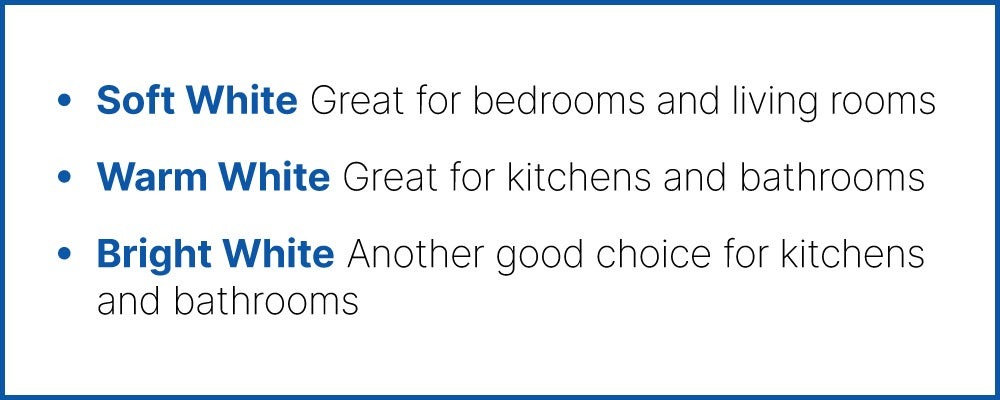Updated 1 year ago
The 5 best energy-efficient light bulbs for your home
Written by
Ana Almerini

Find out what solar panels cost in your area
Energy-efficient lightbulbs can be found at several retailers – and for a good reason. They are less expensive, last longer, and offer brighter light than most traditional bulbs.
Here are our picks for the five best energy-efficient lightbulbs :
Best all-around energy-efficient lightbulb: Phillips Non-Dimmable LED Frosted
Runner-up energy-efficient lightbulb: Phillips Hue Smart Bulb
Best CFL energy-efficient lightbulb: Phillips CFL
Best budget energy-efficient lightbulb: Sylvania LED A19 Bulbs
Notable mention: Amazon Basics 60W LED Bulbs
Let's take a closer look at our top picks and what you need to know when shopping for replacement lightbulbs that can keep your energy costs down.
The top 5 energy-efficient lightbulbs
Looking for the Energy Star label is an easy way to find a trusted brand. Energy Star is an Environmental Protection Agency-backed label to help consumers choose energy-efficient appliances. Once you determine what you need a lightbulb for, it's easy to choose one from our top picks.
Best all-around: Phillips Non-Dimmable LED Frosted

Pros
-
Maintains the look of a classic lightbulb, saving money while not completely changing the aesthetic
-
If used for about 3 hours a day, these lights have a lifetime of about 10 years
-
A soft white glow perfect for an area lamp or entire room, and at a decent price
Cons
-
Not compatible with Philips Hue, which allows you to connect Philips lightbulbs to an app that can change colors, operate the dimmers, and turn your lights on or off.
The Philips LED Frosted Non-Dimmable lights use 80% less energy than a comparable standard incandescent bulb and can last up to 10 years. Great for everyday use and for homes that are not yet fully smart-connected.
Runner up: Philips Hue Smart Bulb

Image source: Amazon
Pros
-
These bulbs can last up to 22 years
-
Bluetooth and wifi compatible
-
App interface allows you to create a complete smart home
Cons
-
The cost per bulb is high
These are the best smart light choice if your home is all wifi-ed up and you want to control your lights via apps on your phone or your Alexa, Google Home, or other gadgets.
Best CFL: Phillips CFL

Image source: Amazon
Pros
-
Made from recycled glass and packaging material
-
Ideal for use in kitchens, living rooms, and hallways
Cons
-
Not compatible with Philips Hue
These CFL bright white lightbulbs are dimmable, letting you easily change the mood of your room.
Budget pick: Sylvania LED A19 bulbs

Image source: Amazon
Pros
-
This 4 pack is a great bargain price and can last up to 11,000 hours
-
Environmentally friendly and can save energy versus traditional light bulbs
Cons
-
Does not have Energy Star seal
These lightbulbs are a great deal with a reasonable price for a six-pack. They cast a soft white glow in any room.
Notable mention: Amazon Basics 60W LED bulbs

Image source: Amazon
Pros
-
10,000 hour lifetime, or 9 years if used 3 hours a day
-
Great cost for 6 bulbs
Cons
-
No Energy Star seal of approval
These light bulbs are a great deal with a reasonable price for a six-pack. They cast a soft white glow in any room.
What types of energy-efficient bulbs are there?
There are three varieties of energy-efficient bulbs: light emitting diode (LED), compact fluorescent lightbulbs (CFL), and Halogen lightbulbs. The three main energy-efficient bulbs differ because of the way that they generate and emit light.
LED: LED lightbulbs emit light when a current flows through them. The current interacts with a semiconducting material, as in electricity-generating. In this case, the material is the diode. The diode then emits light.
CFL: True to their name, CFL lightbulbs have a fluorescent coating within the bulb. Mercury and argon fumes are also contained within the bulb and transform electric currents into UV light. The presence of mercury in these bulbs makes them a challenge to dispose of safely, so they are not our top choice.
Halogen: Halogen bulbs work by using halogen gas to generate electricity and through this process, the gas is recycled, making the bulbs last longer. These bulbs do last the longest but they put off more heat, which is not ideal in a home setting.
What's the most common energy-efficient lightbulb?
The most common type of energy-efficient lightbulb is LED, because it is the most efficient and affordable, and they last the longest with about a 10-year lifespan. LED bulbs are our top choice due to their low cost and great output. But, CFLs are a good second choice.
What to look for when choosing an energy-saving lightbulb
A few things you should check for when deciding on a lightbulb are the bulb's lumens, the color of the bulb, whether it has the ability to dim, and the space you need the bulb for.
For instance, a dining room might require mood lighting where a dimming bulb is necessary while a bright white might make more sense in a bathroom. It’s important to ensure the light fixture can support the wattage of the bulb you are buying for it.
As for lumens, those are essentially a measure of light output per bulb. Watts, on the other hand, measures energy use. Generally, 800 lumens is a good number to look for but standard 100 W bulbs emit 1,600 lumens.
The available types of bulb color temperatures are soft white, warm white, and bright white. They all are perfect for various rooms.

Why choose an energy-efficient bulb?
Energy-efficient bulbs are the way to go. They save money and last longer than traditional incandescent lightbulbs. Energy efficient bulbs, especially those with the Energy Star label, are made to not waste the same amount of energy that traditional bulbs do.
Since there is less wasted energy, less electricity is used, which means lower bills for you. It also means that these bulbs are more environmentally friendly, with less carbon dioxide emitted to power the bulb. But if you have solar panels, energy-efficient bulbs ensure that the power from your solar energy goes further.
It’s not just lightbulbs that can lead you to an energy-saving, less pollution-producing home. Be even more environmentally friendly by adding solar panels to your house. You can switch to energy efficient appliances and get a home energy audit to lower your electricity bill. But the biggest savings come from installing solar panels, which can eliminate your energy bills entirely!
Ana is the Marketing & Communications Manager at SolarReviews, working within the solar industry since 2020. With a Master's in Climate and Society and professional experience in marketing, she helps communicate the value of solar to homeowners and build awareness of the SolarReviews brand. On weekends you can find her at the Jersey shore, reading a book from the ever-increasing stack on her side table, or eating food someone else cooked....
Learn more about Ana Almerini